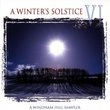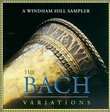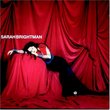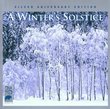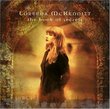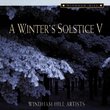| All Artists: Andrew Lloyd Webber, English Chamber Orchestra, Lorin Maazel, Plácido Domingo, Sarah Brightman, Winchester Cathedral Choir Title: Andrew Lloyd Webber - Requiem / Domingo, Brightman, ECO, Maazel Members Wishing: 0 Total Copies: 0 Label: Decca Release Date: 11/14/1995 Genres: Pop, Soundtracks, Classical, Broadway & Vocalists Styles: Vocal Pop, Opera & Classical Vocal, Musicals Number of Discs: 1 SwapaCD Credits: 1 UPC: 028944861624 |
Search - Andrew Lloyd Webber, English Chamber Orchestra, Lorin Maazel :: Andrew Lloyd Webber - Requiem / Domingo, Brightman, ECO, Maazel
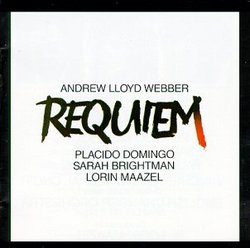 | Andrew Lloyd Webber, English Chamber Orchestra, Lorin Maazel Andrew Lloyd Webber - Requiem / Domingo, Brightman, ECO, Maazel Genres: Pop, Soundtracks, Classical, Broadway & Vocalists
Before Andrew Lloyd Webber's seemingly endless run of Broadway shows, when he was known primarily for Jesus Christ Superstar, he managed to write this dramatic, tuneful, occasionally powerful religious work. Although Llo... more » |
Larger Image |
CD DetailsSynopsis
Amazon.com essential recording Before Andrew Lloyd Webber's seemingly endless run of Broadway shows, when he was known primarily for Jesus Christ Superstar, he managed to write this dramatic, tuneful, occasionally powerful religious work. Although Lloyd Webber takes some liberties with the text and organization of the traditional Requiem mass, the result is a unified and finely crafted composition. There are exciting moments in the "Dies irae" and in the "Lacrymosa", where voices and orchestra are most effectively used to convey the desperate yet hopeful feeling of the text. This work isn't performed much these days in its entirety, but, as in many of Lloyd Webber's musicals, it produced a "hit" tune--the "Pie Jesu"--whose popularity alone could have kept the composer living comfortably for the rest of his life. --David Vernier Similarly Requested CDs
|
CD ReviewsUnlike anything I have heard! Campbell Roark | from under the floorboards and through the woods.. | 04/07/2004 (5 out of 5 stars) "I have no idea what Verdi would make of this. I don't even know what I make of it most of the time- I don't listen to this CD for any religious reason, in fact I'm as reactionary an atheist as you will ever meet. So I'm immune to whatever religious pull this may have. I just don't hear it that way and I honestly don't care how it was intended. Having said that, this music is unlike anything else you will ever hear. It is grandiose, triumphant, sanguine, and full of anguish. It is one of the most luxuriously evocative pieces I have ever heard. This is the sound of a forgotten world trying to make sense of its looming oblivion. It conjures strange and desolate landscapes in my mind... Hordes of libertines crashing through a city in masks, burning themselves alive and shrieking as they throw themselves from smoking spires... A lonely stooped prophet crossing a desert in some post-apocalyptic world, blindly beseeching the terrible sun for penance... An infernal machine, once abandoned, uses a woman as a musical instrument, invades her mind, body and soul and tries to make sense of the world through her plaintive sighs and disjointed memories... Orphans rummage through the shards of what was once a grand floating-city made of crystal... A ship of fools travels the open seas ceaselessly- in their eyes the ocean is a desert... A small child with bright eyes and a rucksack meanders through these scenes, immune to the chaos, narrating the events with solemn pity, watching over the doomed souls who pass through the story. I first heard this in a college philosophy class (thanks Dr. Haist!), and was simply awestruck. Again, I've never heard anything like it. Listen briefly to the samples and see if it has a similar effect on you (especially if you care for religious music of this kind). This is something rare." A Requiem in and of itself Brett A. Kniess | Madison, WI | 11/05/2005 (5 out of 5 stars) "The trouble with reviewing Andrew Lloyd Webber's Requiem is trying to compare it to other Requiem's we are all familiar with without doing either work any unjustice. Sure, I hear a definite influence of Benjaimin Britten, perhaps even a little Bernstein Mass, but this is no War Requiem, and comparing it to other settings by Verdi, Berlioz, Faure, Durufle, or Mozart would be useless. Instead, realize this is a work unto itself. Andrew Lloyd Webber sets the Requiem and Kyrie, Dies Irae, Rex Tremendae, Recordare, Ingemisco, Lacrymosa, Offertorium, Sanctus (Hosanna), Pie Jesu, Lux Aeterna, and the Libera Me sequences of the mass of the dead. Scored for full orchestra (including saxophones), a huge array of percussion (including drum kit), harp, piano, celeste, synthesizer, and organ, this is an orchestration of monumental proportions. The chorus on the recording includes boy sopranos and altos and male tenors and basses along with solos for boy soprano, tenor (Placido Domingo), and soprano (Sarah Brightman). The voices, soloists especially, have extreme ranges (high and low) making this a work requiring virtuosity in the entire ensemble. As for the music, everyone's perception of death is a different and personal experience, thus, ones idea of "Requiem" music will be completely different from others. You can find some snatches of chant-like material, pure melodiousness, great dissonance, revelry, bombasticity, and prayerfulness in this setting. Andrew Lloyd Webber exploits his talent of creating memorable melodies and uses thematic economy to tie the entire work together. The purity of the boy soprano is announced at the beginning with simple octave and fifth leaps, and frames the work by ending on a similar note. The soloists and their extreme ranges portray great angst and tension, but later turns into jubilation. I truly believe this is a serious work; each section gives a personal visualization of the Requiem text and creates a roller-coaster of ideas. The inclusion of more ethnic/modern drums in some places give the music its own Andrew Lloyd Webber personal spin. The entire Requiem is rarely performed in its entirety, nonetheless recorded. This CD will probably remain the preferred performance to have until the end of time, and for good reason. It captures the excitement of a premier recording by consummate artists and performers. If you are looking for an interesting, and perhaps revolutionary, choral work, look no further." This is a really good CD! phantom_mask12@hotmail.com | maryland, usa | 03/14/1999 (4 out of 5 stars) "Well, the 1 thing that made me put 4 stars instead of 5, was, Placido Domingo seems TOO overpowering... I'm not the person that likes tenors all that much (I'm okay with Andrea Bocelli, though! hehehehe)Sarah Brightman does a great job in Requiem & Kyrie, and I love her little 45 second duet with Placido. That's wonderful! I'd just buy the CD for that.. Recordae, she does fabulous, as in Hosanna, Offertorium, and Pie Jesu, and it all! Paul Miles-Kingston does great in Pie Jesu, and especially Rex Tremendae! This whole CD is great though! I'm glad that they didn't have a song just for Placido, though, as they did for Sarah and Paul.But, buy this CD if you have the chance!"
|

 Track Listings (8) - Disc #1
Track Listings (8) - Disc #1